
The police are a constituted body of persons empowered by a state, with the aim to enforce the law, to ensure the safety, health, and possessions of citizens, and to prevent crime and civil disorder. Their lawful powers include arrest and the use of force legitimized by the state via the monopoly on violence. The term is most commonly associated with the police forces of a sovereign state that are authorized to exercise the police power of that state within a defined legal or territorial area of responsibility. Police forces are often defined as being separate from the military and other organizations involved in the defense of the state against foreign aggressors; however, gendarmerie are military units charged with civil policing. Police forces are usually public sector services, funded through taxes.

A coast guard or coastguard is a maritime security organization of a particular country. The term embraces wide range of responsibilities in different countries, from being a heavily armed military force with customs and security duties to being a volunteer organization tasked with search and rescue without law enforcement authority. In most countries, a typical coast guard's functions are distinct from those of the navy and the transit police, while in certain countries they have similarities to both.
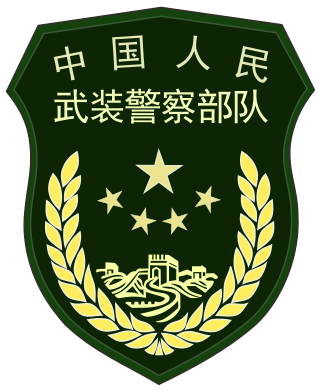
The Chinese People's Armed Police Force is a Chinese paramilitary organization primarily responsible for internal security, riot control, counter-terrorism, disaster response, law enforcement and maritime rights protection as well as providing support to the People's Liberation Army (PLA) during wartime.

Minangkabau people, also known as Minang, are an Austronesian ethnic group native to the Minangkabau Highlands of West Sumatra, Indonesia. The Minangkabau's West Sumatran homelands was the seat of the Pagaruyung Kingdom, believed by early historians to have been the cradle of the Malay race, and the location of the Padri War.

Law enforcement in China consists of an extensive public security system and a variety of enforcement procedures used to maintain order in the country. Along with the courts and procuratorates, the country's judicial and public security agencies include the Ministry of Public Security (MPS) and the Ministry of State Security (MSS), with their descending hierarchy of departments, bureaus, subbureaus, and stations.

Military police (MP) are law enforcement agencies connected with, or part of, the military of a state. In wartime operations, the military police may support the main fighting force with force protection, convoy security, screening, rear reconnaissance, logistic traffic management, counterinsurgency, and detainee handling.

West Sumatra is a province of Indonesia. It is on the west coast of the island of Sumatra and includes the Mentawai Islands off that coast. West Sumatra borders the Indian Ocean to the west, as well as the provinces of North Sumatra to the north, Riau to the northeast, Jambi to the southeast, and Bengkulu to the south. The province has an area of 42,119.54 km2 (16,262.45 sq mi), with a population of 5,534,472 at the 2020 census. The official estimate at mid 2022 was 5,640,629. The province is subdivided into twelve regencies and seven cities. It has relatively more cities than other provinces outside Java, although several of them are relatively low in population compared with cities elsewhere in Indonesia. Padang is the province's capital and largest city.
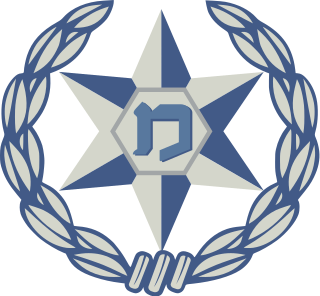
The Israel Police is the civilian police force of Israel. As with most other police forces in the world, its duties include crime fighting, traffic control, maintaining public safety, and counter-terrorism. It is under the jurisdiction of the Minister of Public Security. The National Headquarters of the Israel Police is located at Kiryat HaMemshala in Jerusalem.

Identification badges of the uniformed services of the United States are insignia worn by service members conducting special duties, many of which can be awarded as permanent decorations if those duties are performed successfully. There are a few identification badges that are awarded to all services, others are specific to a uniform service. The Office of the President and Vice President and department/service headquarters badges are permanent decorations for those who successfully serve in those assignments. Some of the service level identification badges can be permanent decorations and others are only worn by a service member while performing specific duties, such as the Military Police Badge.
Law enforcement in Sweden is carried out by several government agencies, under the guidance of the Government of Sweden.

In Brazil, the Federal Constitution establishes eight law enforcement institutions - seven titulars and one auxiliar. The titular institutions are: the Federal Police, the Federal Highway Police, the Federal Railroad Police, the Federal Penal Police, the State Military Police and Fire Brigade, the State Civil Police and the State Penal Police. Of these, the first four are affiliated to federal authorities and the latter three are subordinated to state governments. These public safety institutions are part of the Executive branch of either federal or state government. Apart from these eight institutions, there are others which affiliate to municipal authorities: the Municipal Guards. According to Minister Alexandre de Moraes of the Supreme Federal Court, "...the Municipal Guards are inserted in public safety as the auxiliary and related body of public security force..." Federal law 13,022 gave them de facto and de jure police attributions.
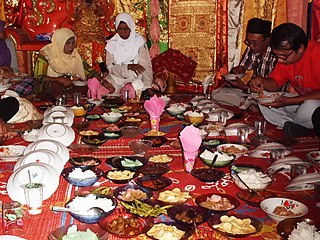
Makan bajamba is the traditional communal meal, shared from one container, and procession of dining on low tables set upon the floor; it is a tradition of the Minangkabau people that has existed since the founding of Islam and is conducted at ceremonial events, holidays, festivals, and important gatherings. Various Minangkabau foods are served in the procession, which is carried in by female participants on their head. That foods are all laid out on metallic trays and then placed on the low tables and consumed while sitting on the floor. This procession opens with the performance of Minangkabau arts and begins with the recitation of traditional Minangkabau proverbs as well as proverbs from the Koran by elders and leaders. Literally, makan bajamba means eating together; it facilitates a sense of togetherness regardless of status of the participants.
Negeri Sembilan Malay is an Austronesian language spoken mainly in the Malaysian state of Negeri Sembilan and in northern Malacca in Alor Gajah. The language is spoken by the descendants of Minangkabau settlers from Sumatra, who have migrated to Negeri Sembilan since as early as the 14th century. It is often considered a variant or dialect of the Minangkabau language; lexical and phonological studies, however, indicate that it is more closely related to Standard Malay than it is to Minangkabau.

Law enforcement in Qatar comes under the control of the Ministry of Interior of Qatar, which administers the various law enforcement agencies of Qatar. Both women and men can be admitted to law enforcement agencies in the country, provided they attend a police academy before being admitted.
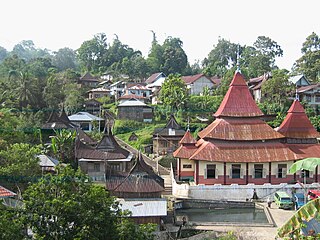
A nagari is a semi-autonomous Minangkabau people regional administrative unit in West Sumatra, Indonesia.
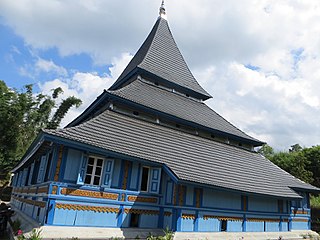
The Bingkudu Mosque is one of the oldest mosques in Indonesia, which was founded by the Padri in the wake of the Padri War in West Sumatra in 1823. This mosque with the typical Minangkabau style architecture is located in Jorong Bingkudu, Nagari Canduang Koto Laweh, Canduang District, Agam Regency, West Sumatra. When it was first built, the building of the mosque was made of wood, on its floor, pole, and its wall.
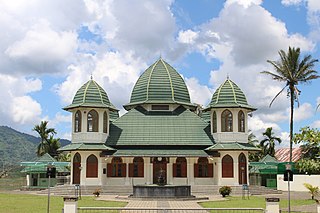
Nurul Iman Mosque of Koto Gadang or Tapi Koto Gadang Mosque is one of the oldest mosques in Indonesia, located in Koto Gadang Nagari, Agam Regency, West Sumatra. This mosque is the largest mosque in Koto Gadang area.

Minangkabau culture is the culture of the Minangkabau ethnic group in Indonesia, part of the Indonesian culture. This culture is one of the two major cultures in the Indonesian archipelago which is very prominent and influential.

The Minangkabau Malaysians are citizens of the Malaysia whose ancestral roots are from Minangkabau of central Sumatra. This includes people born in the Malaysia who are of Minangkabau origin as well as Minangkabau who have migrated to Malaysia. Today, Minangkabau comprise about 989,000 people in Malaysia, and Malaysian law considers most of them to be Malays. They are majority in urban areas, which has traditionally had the highest education and a strong entrepreneurial spirit. The history of the Minangkabau migration to Malay peninsula has been recorded to have lasted a very long time. When the means of transportation were still using the ships by down the rivers and crossing the strait, many Minang people migrated to various regions such as Negeri Sembilan, Malacca, Penang, Kedah, Perak, and Pahang. Some scholars noted that the arrival of the Minangkabau to the Malay Peninsula occurred in the 12th century. This ethnic group moved in to peninsula at the height of the Sultanate of Malacca, and maintains the Adat Perpatih of matrilineal kinships system in Negeri Sembilan and north Malacca.

Marawa is a tricolour flag that consists of three vertical charts that feature the colours of the Minangkabau culture: black, red, and gold. It is not known for sure when this flag was first used, but it was officially adopted as the flag of the Pagaruyung Kingdom since its founding in 1347. This flag was also adopted by other kingdoms of the Minangkabau rantau such as the Inderapura Kingdom. A derivative of the flag is also currently used by Negeri Sembilan, a state in Malaysia with historical and cultural connections with the kingdom.


















